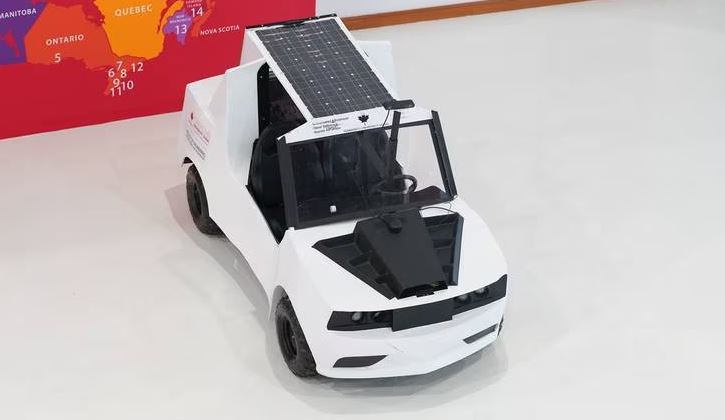Green Technology Triumph: Dubai’s Student-Built Solar Driverless Car
The concept of a solar-powered self-driving car is an exciting fusion of two major technological breakthroughs: solar energy and autonomous driving.
In recent times, solar power has garnered increasing attention as a promising renewable energy source. The idea of harnessing the sun’s energy to power vehicles has long been explored as a way to reduce harmful carbon emissions and dependence on finite fossil fuels, contributing to a more sustainable and eco-friendly transportation future.
In a remarkable development, a team of 22 final-year undergraduate students at the Canadian University in Dubai achieved a significant milestone by successfully creating a solar-powered, self-driving car. Their main objective for this ambitious project was to make commuting between the university’s two campuses in City Walk easier and more convenient. The team comprised students from diverse academic backgrounds, including engineering, applied science, and technology. To efficiently tackle the complexities of the task, they divided into five specialized groups, each responsible for a specific aspect of the car’s design and development.
The first group focused on perfecting the steering system, ensuring precise and reliable control over the vehicle. A second team took charge of designing a top-notch braking system, prioritizing safety as a fundamental aspect. The third team undertook the intricate task of crafting the car’s bodywork, striving to strike a balance between aerodynamic efficiency and aesthetic appeal. Another team tackled the challenge of selecting appropriate materials for the car, considering factors such as strength, weight, and sustainability. Lastly, the fifth team dedicated their efforts to developing a comfortable suspension system to ensure a smooth and pleasant ride for passengers.
Integrating all the different systems seamlessly into a functional car presented a significant challenge for the students. It required meticulous synchronization between the steering system and the central processing unit, acting as the car’s “brain.” This central unit received and processed information from various sensors, such as cameras and Lidar systems, enabling the car to navigate autonomously. Successfully completing this task demanded not only astute engineering skills but also close collaboration among team members. Feras Usmani, a highly talented student with expertise in electrical engineering and mechatronics, emphasized the crucial role of teamwork and engineering prowess in overcoming this challenge.
The successful outcome of the project can be attributed to the invaluable guidance provided by their professors, the students’ effective teamwork, and their collective engineering acumen. Their dedication and hard work ensured the realization of a solar-powered, self-driving car, a source of immense pride for the Canadian University in Dubai.
One of the students, Malak Osama, who was studying mechatronics, shared her enriching experience of working in such a diverse team. She highlighted how the project not only bolstered her knowledge but also honed her programming and engineering skills, providing her with valuable real-world applications of the concepts learned during her academic studies.
This accomplishment further solidifies the UAE’s position as a global leader in adopting and embracing autonomous vehicle technology. With other pioneering companies like Txai and WeRide also making significant strides in this field, the UAE continues to stay at the forefront of innovation in transportation. Collaborations such as that between the Roads and Transport Authority (RTA) and US firm Cruise, aiming to deploy ten driverless taxis in Dubai by the year’s end, exemplify the country’s dedication to revolutionizing transportation and promoting a more sustainable future. The combination of solar-powered and self-driving technology holds immense promise for shaping the future of transportation in an environmentally friendly and efficient manner.

